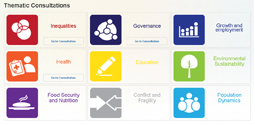The Millennium Development Goals (MDGs) served as a milestone in global development since their inception in 2000. Without losing focus on further progress on the MDGs, it is now time to accelerate thinking on a global development agenda beyond 2015.
The UN Secretary-General has established the UN System Task Team on the Post-2015 UN Development Agenda and a High-level Panel of Eminent Persons. He also appointed a Special Advisor on Post-2015 Development Planning. The purpose of these tracks is to guarantee a broadly consultative process to support the design of the post 2015 UN development agenda.
Meanwhile, the outcome document of the Rio+20 Conference initiated work on a set of sustainable development goals. A 30-member Open Working Group is tasked with submitting a proposal on these goals to the sixty-eighth General Assembly (2013-2014). The Rio+20 outcome provides that the design of the SDGs should be consistent with the post-2015 process.
The UN Department of Economic and Social Affairs (DESA) is fully engaged in promoting and supporting the emergence of a solid and ambitious post-2015 development agenda, with sustainable development at its centre.
UN System Task Team on the Post-2015 UN Development Agenda
The UN System Task Team was established by the UN Secretary-General in January 2012 to support system-wide preparations for the post-2015 development agenda. It brings together over 60 UN entities and agencies and international organizations and is jointly chaired by DESA and UNDP. The Task Team provides analytical inputs, expertise and outreach into the discussion on the post-2015 development agenda.
It presented its first report, titled Realizing the Future We Want for All, in June 2012 (The report is available in all 6 languages). The report lays out the Task Team’s main recommendations for a development agenda beyond 2015. It calls for an integrated policy approach to ensure inclusive economic development, inclusive social development, peace and security and environmental sustainability within a development agenda that responds to the aspirations of all people for a world free of want and fear.
To develop further analytical inputs, the UN Task Team formed several working groups on the global partnership for development, monitoring and indicators in the post-2015 era and financing for sustainable development. The Technical Support Team to provide support to the Open Working Group was also established under the umbrella of the UN Task Team.

The working group on the global partnership for development published its report A renewed global partnership for development in March 2013. The report assesses lessons learnt from MDG 8 and provides a set of recommendations on the contours and format of a renewed global partnership for development in the post-2015 era. In order to address the global challenges at hand, such a partnership must build on a strong narrative to generate collective action from all countries.
National and global thematic consultations
 The UN Development Group has launched a set of eleven thematic consultations and national consultations in more than 60 countries. Jointly organized by various UN entities and with support from Civil Society Organizations and other stakeholders, the consultations will help guide thinking on how to include emerging and pressing issues in the post-2015 development agenda. DESA is fully engaged in the thematic consultations with active contributions from several Divisions. A report with the first findings from the consultation, The global conversation begins, was published in March 2013.
The UN Development Group has launched a set of eleven thematic consultations and national consultations in more than 60 countries. Jointly organized by various UN entities and with support from Civil Society Organizations and other stakeholders, the consultations will help guide thinking on how to include emerging and pressing issues in the post-2015 development agenda. DESA is fully engaged in the thematic consultations with active contributions from several Divisions. A report with the first findings from the consultation, The global conversation begins, was published in March 2013.
The eleven thematic consultations are:
- Conflict and Fragility
- Education
- Environmental Sustainability
- Governance
- Growth and employment
- Health
- Hunger, food and nutrition security
- Inequalities
- Population Dynamics
- Energy
- Water
Development Cooperation Forum (DCF)
Based on its multi-stakeholder convening power, the Development Cooperation Forum, which is a subsidiary body of the Economic and Social Council, is initiating a dialogue on the possible features of a renewed global partnership for development, and characteristics of a monitoring and accountability framework. Representatives from governments, civil society, philanthropic organizations, academia and the private sector are being engaged in these conversations, which will also examine the broader implications – for development cooperation – of a post-2015 development agenda.
Committee for Development Policy (CDP)
The Committee for Development Policy, which is a subsidiary body of the Economic and Social Council, provides inputs and independent advice on emerging cross-sectoral development issues. Members of CDP have also been working on conceptual issues around the post-2015 development agenda. In June 2012, the committee published a policy note on the UN Development Strategy Beyond 2015, followed by several DESA Working Papers on the post-2015. Additional working papers from the CDP and further analytical inputs to post-2015 thinking will be forthcoming.
Accelerating progress towards the MDGs: options for sustained and inclusive growth and issues for advancing the UN development agenda beyond 2015
In the outcome document of the High-level Plenary Meeting of the General Assembly on the Millennium Development Goals (MDGs), Member States requested the Secretary-General to report annually on progress in the implementation of the MDGs and to make recommendations for further steps to advance the UN development agenda beyond 2015. In a subsequent resolution 65/10, the General Assembly requested the Secretary-General to include an analysis of and policy recommendations on sustained, inclusive and equitable economic growth for accelerating poverty eradication and achievement of the MDGs in his annual report.
The second annual report was published in September 2012 and is available in all six official UN languages through the Official Document System of the United Nations (ODS).


